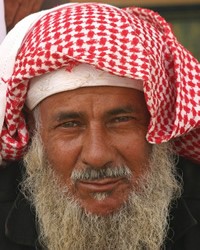Arab, Saudi - Hijazi in United Arab Emirates

Photo Source:
Tribes of the World - Flickr
Creative Commons
|
Send Joshua Project a map of this people group.
|
| People Name: | Arab, Saudi - Hijazi |
| Country: | United Arab Emirates |
| 10/40 Window: | Yes |
| Population: | 442,000 |
| World Population: | 10,559,000 |
| Primary Language: | Arabic, Hijazi |
| Primary Religion: | Islam |
| Christian Adherents: | 0.00 % |
| Evangelicals: | 0.00 % |
| Scripture: | Portions |
| Ministry Resources: | Yes |
| Jesus Film: | Yes |
| Audio Recordings: | Yes |
| People Cluster: | Arab, Arabian |
| Affinity Bloc: | Arab World |
| Progress Level: |
|
Introduction / History
Saudi Arabia is home to several Arab groups. The Hijazi Arabs (more commonly known as the Saudi Arabs) form most of the local Saudi Arabian population and live predominantly along the Red Sea coast and in the major urban areas. They speak a language called Arabiya, or, as it is more commonly called, Hijazi Arabic.
The Arab culture was developed by tribes of nomads and villagers who lived in the Arabian Desert. From there, Arab migrations spread throughout the Middle East and northern Africa, leading to the expansion of the Arab world. Though most of the Hijazi speakers live in Saudi Arabia, some have migrated to the United Arab Emirates (UAE).
What Are Their Lives Like?
In accordance with their Muslim religion, Hijazi Arab marriages are typically endogamous, which means that they only marry within a small social circle. Inheritance is patrilineal (passed down from fathers to their sons).
Hijazi Arab clothing is designed for the harsh desert climate. It is made of lightweight, light-colored fabric and is also loose-fitting, allowing for the circulation of air.
In the past, the Hijazi Arabs considered it shameful and degrading to have jobs doing manual labor. However, this has changed in recent decades. They recognize their need for a higher income, improved health facilities, and better housing. For that reason some have accepted wage-paying jobs. Nevertheless, most of Hijazi Arab still despise such positions.
The Hijazi have their own style of architecture which involves the use of rocks and wood. Their style has affected the entire Arab world for centuries.
What Are Their Beliefs?
Hijazi Arabs are practically all Muslim, but represent a variety of Islamic sects. The founding of Islam in the seventh century profoundly altered the course of Saudi history. In the mid-1700s, Mohammed ibn Abd al-Wahhab formed his fundamentalist sect, and today, the Saudi see themselves as the preservers of the true Islamic faith. The city of Mecca on the Red Sea coast is the holy place of pilgrimage that all Muslims must try to visit at least once in their lifetime.
What Are Their Needs?
Few if any Hijazi Arabs in Saudi Arabia, the UAE, Qatar, or Egypt have accepted Jesus as their Savior. A profession of faith in Jesus will most likely cost a person his family, his honor, his job, or even his life. Evangelization of this group will be challenging, due to the nature of their lifestyle and belief system. It will take much prayer to break down the spiritual strongholds that have kept them away from the blessings of Jesus Christ for hundreds of years.
Prayer Points
Pray for a movement to Christ among the Hijazi Arabs that will last for generations to come.
Pray that the gospel message will become widely available to the Hijazi Arabic speakers.
Pray that this people group will crave pure spiritual milk and find it in the gospel.
Pray for Hijazi Arab leaders to have dreams of the risen and victorious Christ, who came to forgive us of sin and free us from the work of Satan.